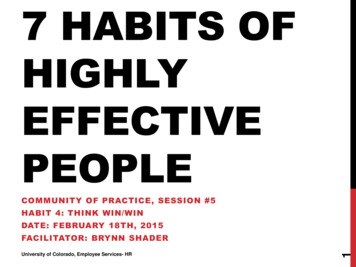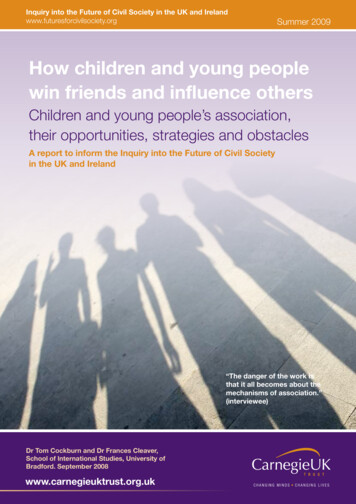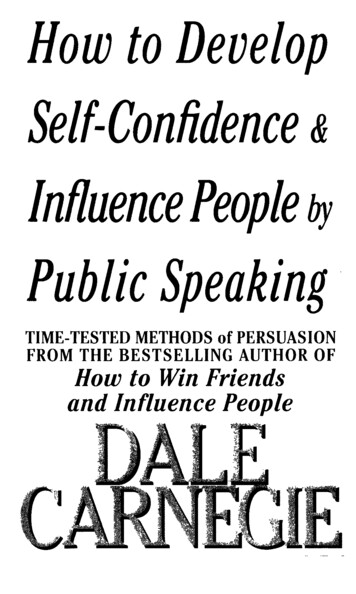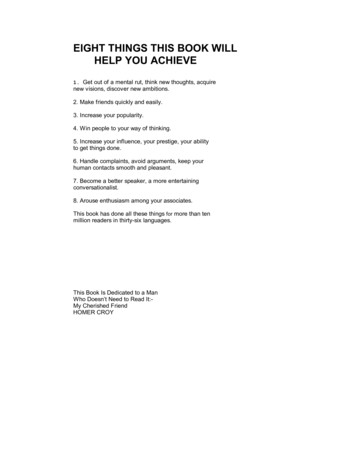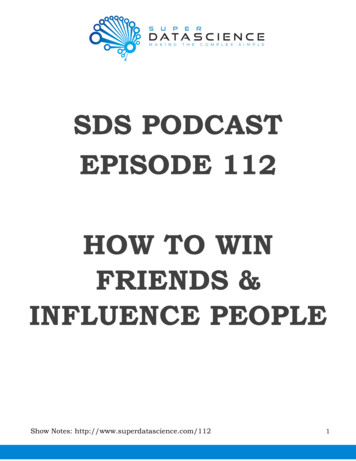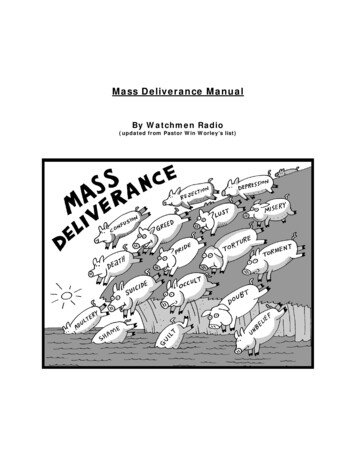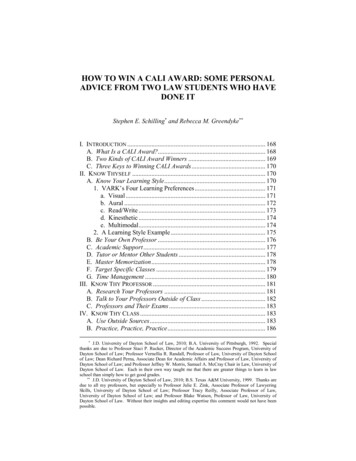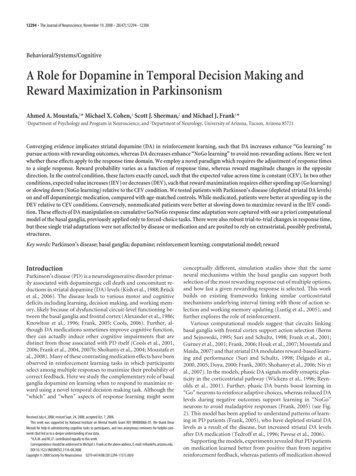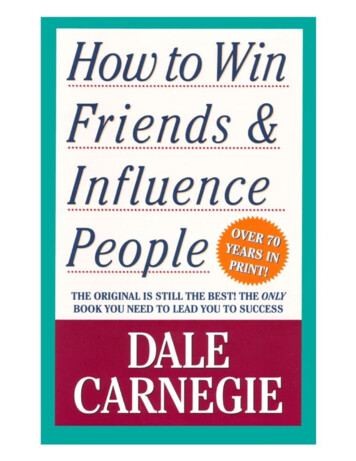
Transcription
CONTENTSCoverAbout the AuthorAlso by Dale CarnegieTitle PageDedicationPreface to revised editionHow this book was written – and whyNine suggestions on how to get the most out of this bookPART ONE: FUNDAMENTAL TECHNIQUES IN HANDLING PEOPLE1 ‘If You Want to Gather Honey, Don’t Kick Over the Beehive’2 The Big Secret of Dealing with People3 ‘He Who Can Do This Has the Whole World with Him. He Who CannotWalks a Lonely Way’PART TWO: SIX WAYS TO MAKE PEOPLE LIKE YOU1 Do This and You’ll Be Welcome Anywhere2 A Simple Way to Make a Good First Impression3 If You Don’t Do This, You Are Headed for Trouble4 An Easy Way to Become a Good Conversationalist5 How to Interest People6 How to Make People Like You Instantly
PART THREE: HOW TO WIN PEOPLE TO YOUR WAY OF THINKING1 You Can’t Win an Argument2 A Sure Way of Making Enemies – and How to Avoid It3 If You’re Wrong, Admit It4 A Drop of Honey5 The Secret of Socrates6 The Safety Valve in Handling Complaints7 How to Get Cooperation8 A Formula That Will Work Wonders for You9 What Everybody Wants10 An Appeal That Everybody Likes11 The Movies Do It. TV Does It. Why Don’t You Do It?12 When Nothing Else Works, Try ThisPART FOUR: BE A LEADER: HOW TO CHANGE PEOPLE WITHOUTGIVING OFFENCE OR AROUSING RESENTMENT1 If You Must Find Fault, This Is the Way to Begin2 How to Criticise – and Not Be Hated for It3 Talk About Your Own Mistakes First4 No One Likes to Take Orders5 Let the Other Person Save Face6 How to Spur People On to Success7 Give a Dog a Good Name8 Make the Fault Seem Easy to Correct9 Making People Glad to Do What You WantA Shortcut to DistinctionCopyright
About the AuthorDale Carnegie, known as ‘the arch-priest of the art of making friends’, pioneeredthe development of personal business skills, self-confidence and motivationaltechniques. His books – most notably How to Win Friends and Influence People– have sold tens of millions worldwide and, even in today’s changing climate,they remain as popular as ever.
By the same authorHow to Develop Self-confidence and Influence People by Public SpeakingHow to Enjoy Your Life and Your JobHow to Stop Worrying and Start LivingThe Quick and Easy Way to Effective Speaking
This book is dedicated to a manwho doesn’t need to read it:my cherished friend Homer Croy
EIGHT THINGS THIS BOOK WILL HELP YOU ACHIEVEGet out of a mental rut, think new thoughts, acquire new visions, discover new ambitions. Make friends quickly and easily. Increase your popularity. Win people to your way of thinking. Increase your influence, your prestige, your ability to get things done. Handle complaints, avoid arguments, keep your human contacts smooth and pleasant. Become a better speaker, a more entertaining conversationalist. Arouse enthusiasm among your associates. This book has done all these things for more than ten million readers in thirty-six languages.
How to win Friends and Influence People was first published in 1937 in anedition of only five thousand copies. Neither Dale Carnegie nor the publishers,Simon and Schuster, anticipated more than this modest sale. To their amazement,the book became an overnight sensation, and edition after edition rolled off thepresses to keep up with the increasing public demand. How to Win Friends andInfluence People took its place in publishing history as one of the all-timeinternational bestsellers. It touched a nerve and filled a human need that wasmore than a faddish phenomenon of post-Depression days, as evidenced by itscontinued and uninterrupted sales into the eighties, almost half a century later.Dale Carnegie used to say that it was easier to make a million dollars thanto put a phrase into the English language. How to Win Friends and InfluencePeople became such a phrase, quoted, paraphrased, parodied, used ininnumerable contexts from political cartoon to novels. The book itself wastranslated into almost every known written language. Each generation hasdiscovered it anew and has found it relevant.Which brings us to the logical question: Why revise a book that has provenand continues to prove its vigorous and universal appeal? Why tamper withsuccess?To answer that, we must realise that Dale Carnegie himself was a tirelessreviser of his own work during his lifetime. How to Win Friends and InfluencePeople was written to be used as a textbook for his courses in Effective Speakingand Human Relations and is still used in those courses today. Until his death in1955 he constantly improved and revised the course itself to make it applicableto the evolving needs of an evergrowing public. No one was more sensitive tothe changing currents of present-day life than Dale Carnegie. He constantlyimproved and refined his methods of teaching; he updated his book on EffectiveSpeaking several times. Had he lived longer, he himself would have revised Howto Win Friends and Influence People to better reflect the changes that have takenplace in the world since the thirties.Many of the names of prominent people in the book, well known at the timeof first publication, are no longer recognised by many of today’s readers. Certainexamples and phrases seem as quaint and dated in our social climate as those ina Victorian novel. The important message and overall impact of the book is
weakened to that extent.Our purpose, therefore, in this revision is to clarify and strengthen the bookfor a modern reader without tampering with the content. We have not ‘changed’How to Win Friends and Influence People except to make a few excisions andadd a few more contemporary examples. The brash, breezy Carnegie style isintact – even the thirties slang is still there. Dale Carnegie wrote as he spoke, inan intensively exuberant, colloquial, conversational manner.So his voice still speaks as forcefully as ever, in the book and in his work.Thousands of people all over the world are being trained in Carnegie courses inincreasing numbers each year. And other thousands are reading and studyingHow to Win Friends and Influence People and being inspired to use its principlesto better their lives. To all of them, we offer this revision in the spirit of thehoning and polishing of a finely made tool.
Dorothy Carnegie(Mrs. Dale Carnegie)
During the first thirty-five years of the twentieth century, the publishing housesof America printed more than a fifth of a million different books. Most of themwere deadly dull, and many were financial failures. ‘Many,’ did I say? Thepresident of one of the largest publishing houses in the world confessed to methat his company, after seventy-five years of publishing experience, still lostmoney on seven out of every eight books it published.Why, then, did I have the temerity to write another book? And, after I hadwritten it, why should you bother to read it?Fair questions, both; and I’ll try to answer them.I have, since 1912, been conducting educational courses for business andprofessional men and women in New York. At first, I conducted courses inpublic speaking only – courses designed to train adults, by actual experience, tothink on their feet and express their ideas with more clarity, more effectivenessand more poise, both in business interviews and before groups.But gradually, as the seasons passed, I realised that as sorely as these adultsneeded training in effective speaking, they needed still more training in the fineart of getting along with people in everyday business and social contacts.I also gradually realised that I was sorely in need of such training myself.As I look back across the years, I am appalled at my own frequent lack of finesseand understanding. How I wish a book such as this had been placed in my handstwenty years ago! What a priceless boon it would have been.Dealing with people is probably the biggest problem you face, especially ifyou are in business. Yes, and that is also true if you are a housewife, architect orengineer. Research done a few years ago under the auspices of the CarnegieFoundation for the Advancement of Teaching uncovered a most important andsignificant fact – a fact later confirmed by additional studies made at theCarnegie Institute of Technology. These investigations revealed that even in suchtechnical lines as engineering, about 15 percent of one’s financial success is dueto one’s technical knowledge and about 85 percent is due to skill in humanengineering – to personality and the ability to lead people.For many years, I conducted courses each season at the Engineers’ Club of
Philadelphia, and also courses for the New York Chapter of the AmericanInstitute of Electrical Engineers. A total of probably more than fifteen hundredengineers have passed through my classes. They came to me because they hadfinally realised, after years of observation and experience, that the highest-paidpersonnel in engineering are frequently not those who know the most aboutengineering. One can, for example, hire mere technical ability in engineering,accountancy, architecture or any other profession at nominal salaries. But theperson who has technical knowledge plus the ability to express ideas, to assumeleadership, and to arouse enthusiasm among people – that person is headed forhigher earning power.In the heyday of his activity, John D. Rockefeller said that ‘the ability todeal with people is as purchasable a commodity as sugar or coffee.’ ‘And I willpay more for that ability,’ said John D., ‘than for any other under the sun.’Wouldn’t you suppose that every college in the land would conduct coursesto develop the highest-priced ability under the sun? But if there is just onepractical, common-sense course of that kind given for adults in even one collegein the land, it has escaped my attention up to the present writing.The University of Chicago and the United Y.M.C.A. Schools conducted asurvey to determine what adults want to study.That survey cost 25,000 and took two years. The last part of the surveywas made in Meriden, Connecticut. It had been chosen as a typical Americantown. Every adult in Meriden was interviewed and requested to answer 156questions – questions such as ‘What is your business or profession? Youreducation? How do you spend your spare time? What is your income? Yourhobbies? Your ambitions? Your problems? What subjects are you most interestedin studying?’ And so on. That survey revealed that health is the prime interest ofadults – and that their second interest is people; how to understand and get alongwith people; how to make people like you; and how to win others to your way ofthinking.So the committee conducting this survey resolved to conduct such a coursefor adults in Meriden. They searched diligently for a practical textbook on thesubject and found – not one. Finally they approached one of the world’soutstanding authorities on adult education and asked him if he knew of any bookthat met the needs of this group. ‘No,’ he replied, ‘I know what those adultswant. But the book they need has never been written.’I knew from experience that this statement was true, for I myself had beensearching for years to discover a practical, working handbook on humanrelations.Since no such book existed, I have tried to write one for use in my own
courses. And here it is. I hope you like it.In preparation for this book, I read everything that I could find on thesubject – everything from newspaper columns, magazine articles, records of thefamily courts, the writings of the old philosophers and the new psychologists. Inaddition, I hired a trained researcher to spend one and a half years in variouslibraries reading everything I had missed, ploughing through erudite tomes onpsychology, poring over hundreds of magazine articles, searching throughcountless biographies, trying to ascertain how the great leaders of all ages haddealt with people. We read their biographies. We read the life stories of all greatleaders from Julius Caesar to Thomas Edison. I recall that we read over onehundred biographies of Theodore Roosevelt alone. We were determined to spareno time, no expense, to discover every practical idea that anyone had ever usedthroughout the ages for winning friends and influencing people.I personally interviewed scores of successful people, some of them worldfamous – inventors like Marconi and Edison; political leaders like Franklin D.Roosevelt and James Farley; business leaders like Owen D. Young; movie starslike Clark Gable and Mary Pickford; and explorers like Martin Johnson – andtried to discover the techniques they used in human relations.From all this material, I prepared a short talk. I called it ‘How to WinFriends and Influence People.’ I say ‘short.’ It was short in the beginning, but itsoon expanded to a lecture that consumed one hour and thirty minutes. Foryears, I gave this talk each season to the adults in the Carnegie Institute coursesin New York.I gave the talk and urged the listeners to go out and test it in their businessand social contacts, and then come back to class and speak about theirexperiences and the results they had achieved. What an interesting assignment!These men and women, hungry for self-improvement, were fascinated by theidea of working in a new kind of laboratory – the first and only laboratory ofhuman relationships for adults that had ever existed.This book wasn’t written in the usual sense of the word. It grew as a childgrows. It grew and developed out of that laboratory, out of the experiences ofthousands of adults.Years ago, we started with a set of rules printed on a card no larger than apostcard. The next season we printed a larger card, then a leaflet, then a series ofbooklets, each one expanding in size and scope. After fifteen years ofexperiment and research came this book.The rules we have set down here are not mere theories or guesswork. Theywork like magic. Incredible as it sounds, I have seen the application of theseprinciples literally revolutionise the lives of many people.
To illustrate: A man with 314 employees joined one of these courses. Foryears, he had driven and criticised and condemned his employees without stintor discretion. Kindness, words of appreciation and encouragement were alien tohis lips. After studying the principles discussed in this book, this employersharply altered his philosophy of life. His organisation is now inspired with anew loyalty, a new enthusiasm, a new spirit of teamwork. Three hundred andfourteen enemies have been turned into 314 friends. As he proudly said in aspeech before the class: ‘When I used to walk through my establishment, no onegreeted me. My employees actually looked the other way when they saw meapproaching. But now they are all my friends and even the janitor calls me bymy first name.’This employer gained more profit, more leisure and – what is infinitelymore important – he found far more happiness in his business and in his home.Countless numbers of salespeople have sharply increased their sales by theuse of these principles. Many have opened up new accounts – accounts that theyhad formerly solicited in vain. Executives have been given increased authority,increased pay. One executive reported a large increase in salary because heapplied these truths. Another, an executive in the Philadelphia Gas WorksCompany, was slated for demotion when he was sixty-five because of hisbelligerence, because of his inability to lead people skillfully. This training notonly saved him from the demotion but brought him a promotion with increasedpay.On innumerable occasions, spouses attending the banquet given at the endof the course have told me that their homes have been much happier since theirhusbands or wives started this training.People are frequently astonished at the new results they achieve. It allseems like magic. In some cases, in their enthusiasm, they have telephoned me atmy home on Sundays because they couldn’t wait forty-eight hours to report ontheir achievements at the regular session of the course.One man was so stirred by a talk on these principles that he sat far into thenight discussing them with other members of the class. At three o’clock in themorning, the others went home. But he was so shaken by a realisation of his ownmistakes, so inspired by the vista of a new and richer world opening before him,that he was unable to sleep. He didn’t sleep that night or the next day or the nextnight.Who was he? A naïve, untrained individual ready to gush over any newtheory that came along? No. Far from it. He was a sophisticated, blasé dealer inart, very much the man about town, who spoke three languages fluently and wasa graduate of two European universities.
While writing this chapter, I received a letter from a German of the oldschool, an aristocrat whose forebears had served for generations as professionalarmy officers under the Hohenzollerns. His letter, written from a transatlanticsteamer, telling about the application of these principles, rose almost to areligious fervor.Another man, an old New Yorker, a Harvard graduate, a wealthy man, theowner of a large carpet factory, declared he had learned more in fourteen weeksthrough this system of training about the fine art of influencing people than hehad learned about the same subject during his four years in college. Absurd?Laughable? Fantastic? Of course, you are privileged to dismiss this statementwith whatever adjective you wish. I am merely reporting, without comment, adeclaration made by a conservative and eminently successful Harvard graduatein a public address to approximately six hundred people at the Yale Club in NewYork on the evening of Thursday, February 23, 1933.‘Compared to what we ought to be,’ said the famous Professor WilliamJames of Harvard, ‘compared to what we ought to be, we are only half awake.We are making use of only a small part of our physical and mental resources.Stating the thing broadly, the human individual thus lives far within his limits.He possesses powers of various sorts which he habitually fails to use.’Those powers which you ‘habitually fail to use’! The sole purpose of thisbook is to help you discover, develop and profit by those dormant and unusedassets.‘Education,’ said Dr. John G. Hibben, former president of PrincetonUniversity, ‘is the ability to meet life’s situations.’If by the time you have finished reading the first three chapters of this book– if you aren’t then a little better equipped to meet life’s situations, then I shallconsider this book to be a total failure so far as you are concerned. For ‘the greataim of education,’ said Herbert Spencer, ‘is not knowledge but action.’And this is an action book.Dale Carnegie 1936
NINE SUGGESTIONS ON HOW TO GET THE MOST OUT OF THISBOOK1. If you wish to get the most out of this book, there is one indispensablerequirement, one essential infinitely more important than any rule ortechnique. Unless you have this one fundamental requisite, a thousand ruleson how to study will avail little. And if you do have this cardinalendowment, then you can achieve wonders without reading any suggestionsfor getting the most out of a book.What is this magic requirement? Just this: a deep, driving desire tolearn, a vigorous determination to increase your ability to deal with people.How can you develop such an urge? By constantly reminding yourselfhow important these principles are to you. Picture to yourself how theirmastery will aid you in leading a richer, fuller, happier and more fulfillinglife. Say to yourself over and over: ‘My popularity, my happiness and senseof worth depend to no small extent upon my skill in dealing with people.’2. Read each chapter rapidly at first to get a bird’s-eye view of it. You willprobably be tempted then to rush on to the next one. But don’t – unless youare reading merely for entertainment. But if you are reading because youwant to increase your skill in human relations, then go back and reread eachchapter thoroughly. In the long run, this will mean saving time and gettingresults.3. Stop frequently in your reading to think over what you are reading. Askyourself just how and when you can apply each suggestion.4. Read with a crayon, pencil, pen, magic marker or highlighter in yourhand. When you come across a suggestion that you feel you can use, draw aline beside it. If it is a four-star suggestion, then underscore every sentenceor highlight it, or mark it with ‘****.’ Marking and underscoring a bookmakes it more interesting, and far easier to review rapidly.5. I knew a woman who had been office manager for a large insuranceconcern for fifteen years. Every month, she read all the insurance contractsher company had issued that month. Yes, she read many of the samecontracts over month after month, year after year. Why? Because
experience had taught her that that was the only way she could keep theirprovisions clearly in mind.I once spent almost two years writing a book on public speaking andyet I found I had to keep going back over it from time to time in order toremember what I had written in my own book. The rapidity with which weforget is astonishing.So, if you want to get a real, lasting benefit out of this book, don’timagine that skimming through it once will suffice. After reading itthoroughly, you ought to spend a few hours reviewing it every month. Keepit on your desk in front of you every day. Glance through it often. Keepconstantly impressing yourself with the rich possibilities for improvementthat still lie in the offing. Remember that the use of these principles can bemade habitual only by a constant and vigorous campaign of review andapplication. There is no other way.6. Bernard Shaw once remarked: ‘If you teach a man anything, he willnever learn.’ Shaw was right. Learning is an active process. We learn bydoing. So, if you desire to master the principles you are studying in thisbook, do something about them. Apply these rules at every opportunity. Ifyou don’t you will forget them quickly. Only knowledge that is used sticksin your mind.You will probably find it difficult to apply these suggestions all thetime. I know because I wrote the book, and yet frequently I found itdifficult to apply everything I advocated. For example, when you aredispleased, it is much easier to criticise and condemn than it is to try tounderstand the other person’s viewpoint. It is frequently easier to find faultthan to find praise. It is more natural to talk about what you want than totalk about what the other person wants. And so on. So, as you read thisbook, remember that you are not merely trying to acquire information. Youare attempting to form new habits. Ah yes, you are attempting a new way oflife. That will require time and persistence and daily application.So refer to these pages often. Regard this as a working handbook onhuman relations; and whenever you are confronted with some specificproblem – such as handling a child, winning your spouse to your way ofthinking, or satisfying an irritated customer – hesitate about doing thenatural thing, the impulsive thing. This is usually wrong. Instead, turn tothese pages and review the paragraphs you have underscored. Then trythese new ways and watch them achieve magic for you.
7. Offer your spouse, your child or some business associate a dime or adollar every time he or she catches you violating a certain principle. Make alively game out of mastering these rules.8. The president of an important Wall Street bank once described, in a talkbefore one of my classes, a highly efficient system he used for selfimprovement. This man had little formal schooling; yet he had become oneof the most important financiers in America, and he confessed that he owedmost of his success to the constant application of his homemade system.This is what he does. I’ll put it in his own words as accurately as I canremember.‘For years I have kept an engagement book showing all theappointments I had during the day. My family never made any plans for meon Saturday night, for the family knew that I devoted a part of eachSaturday evening to the illuminating process of self-examination andreview and appraisal. After dinner I went off by myself, opened myengagement book, and thought over all the interviews, discussions andmeetings that had taken place during the week. I asked myself:‘“What mistakes did I make that time?”‘“What did I do that was right – and in what way could I haveimproved my performance?”‘“What lessons can I learn from that experience?”‘I often found that this weekly review made me very unhappy. I wasfrequently astonished at my own blunders. Of course, as the years passed,these blunders became less frequent. Sometimes I was inclined to patmyself on the back a little after one of these sessions. This system of selfanalysis, self-education, continued year after year, did more for me than anyother one thing I have ever attempted.‘It helped me improve my ability to make decisions – and it aided meenormously in all my contacts with people. I cannot recommend it toohighly.’Why not use a similar system to check up on your application of theprinciples discussed in this book? If you do, two things will result.First, you will find yourself engaged in an educational process that isboth intriguing and priceless.Second, you will find that your ability to meet and deal with peoplewill grow enormously.9. You will find at the end of this book several blank pages on which you
should record your triumphs in the application of these principles. Bespecific. Give names, dates, results. Keeping such a record will inspire youto greater efforts; and how fascinating these entries will be when youchance upon them some evening years from now!In order to get the most out of this book:a. Develop a deep, driving desire to master the principles of humanrelations.b. Read each chapter twice before going on to the next one.c. As you read, stop frequently to ask yourself how you can apply eachsuggestion.d. Underscore each important idea.e. Review this book each month.f. Apply these principles at every opportunity. Use this volume as a workinghandbook to help you solve your daily problems.g. Make a lively game out of your learning by offering some friend a dimeor a dollar every time he or she catches you violating one of theseprinciples.h. Check up each week on the progress you are making. Ask yourself whatmistakes you have made, what improvement, what lessons you have learnedfor the future.i. Keep notes in the back of this book showing how and when you haveapplied these principles.
ON MAY 7,1931, the most sensational manhunt New York City had ever knownhad come to its climax. After weeks of search, ‘Two Gun’ Crowley – the killer,the gunman who didn’t smoke or drink – was at bay, trapped in his sweetheart’sapartment on West End Avenue.One hundred and fifty policemen and detectives laid siege to his top-floorhideaway. They chopped holes in the roof; they tried to smoke out Crowley, the‘cop killer,’ with teargas. Then they mounted their machine guns on surroundingbuildings, and for more than an hour one of New York’s fine residential areasreverberated with the crack of pistol fire and the rat-tat-tat of machine guns.Crowley, crouching behind an overstuffed chair, fired incessantly at the police.Ten thousand excited people watched the battle. Nothing like it had ever beenseen before on the sidewalks of New York.When Crowley was captured, Police Commissioner E.P. Mulrooneydeclared that the two-gun desperado was one of the most dangerous criminalsever encountered in the history of New York. ‘He will kill,’ said theCommissioner, ‘at the drop of a feather.’But how did ‘Two Gun’ Crowley regard himself? We know, because whilethe police were firing into his apartment, he wrote a letter addressed ‘To whom itmay concern.’ And, as he wrote, the blood flowing from his wounds left acrimson trail on the paper. In this letter Crowley said: ‘Under my coat is a wearyheart, but a kind one – one that would do nobody any harm.’A short time before this, Crowley had been having a necking party with hisgirl friend on a country road out on Long Island. Suddenly a policeman walkedup to the car and said: ‘Let me see your license.’Without saying a word, Crowley drew his gun and cut the policeman downwith a shower of lead. As the dying officer fell, Crowley leaped out of the car,grabbed the officer’s revolver, and fired another bullet into the prostrate body.And that was the killer who said: ‘Under my coat is a weary heart, but a kind one– one that would do nobody any harm.’Crowley was sentenced to the electric chair. When he arrived at the death
house in Sing Sing, did he say, ‘This is what I get for killing people’? No, hesaid: ‘This is what I get for defending myself.’The point of the story is this: ‘Two Gun’ Crowley didn’t blame himself foranything.Is that an unusual attitude among criminals? If you think so, listen to this:‘I have spent the best years of my life giving people the lighter pleasures,helping them have a good time, and all I get is abuse, the existence of a huntedman.’That’s Al Capone speaking. Yes, America’s most notorious Public Enemy –the most sinister gang leader who ever shot up Chicago. Capone didn’t condemnhimself. He actually regarded himself as a public benefactor – an unappreciatedand misunderstood public benefactor.And so did Dutch Schultz before he crumpled up under gangster bullets inNewark. Dutch Schultz, one of New York’s most notorious rats, said in anewspaper interview that he was a public benefactor. And he believed it.I have had some interesting correspondence with Lewis Lawes, who waswarden of New York’s infamous Sing Sing prison for many years, on thissubject, and he declared that ‘few of the criminals in Sing Sing regardthemselves as bad men. They are just as human as you and I. So they rationalise,they explain. They can tell you why they had to crack a safe or be quick on thetrigger finger. Most of them attempt by a form of reasoning, fallacious or logical,to justify their antisocial acts even to themselve
to Win Friends and Influence People to better reflect the changes that have taken place in the world since the thirties. Many of the names of prominent people in the book, well known at the time of first publication, are no longer recognised by many of today’s readers. Certain
